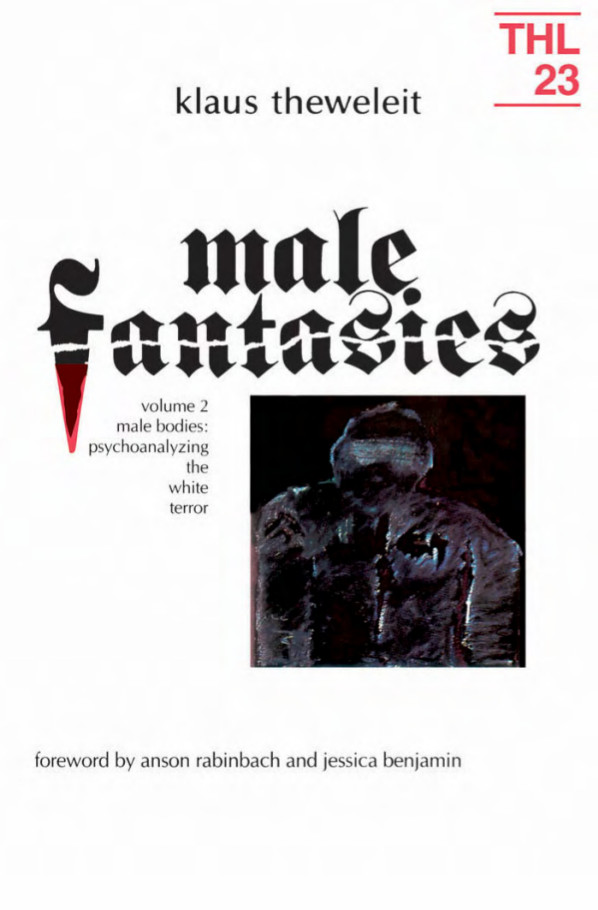Klaus Theweleit: Male Fantasies, 2 vols. (1977-78/1987)
Filed under book | Tags: · fantasy, fascism, literature, men, military, nazism, psychoanalysis, sex, sociology, women


These two volumes center upon the fantasies that preoccupied a group of men who played a crucial role in the rise of Nazism. Theweleit draws upon the novels, letters, and autobiographies of these proto-fascists and their contemporaries, seeking out and reconstructing their images of women.
“Theweleit’s study of the fascist consciousness in general and the bodily experience of these former soldiers in particular, easily detected in their hatefilled, near-illiterate books, was well received. Theweleit used Wilhelm Reich, Gilles Deleuze and Félix Guattari for his basic theory, but also empirical research, especially of the leading German left-wing historian of Weimar unrest, his friend Erhard Lucas and he was always discussing his findings with his wife, who has professional clinical experience. Theweleit writes in an anti-academic, highly personal style.” (from Wikipedia)
Heavily illustrated with cartoons, advertisements, engravings, and posters of the era.
Volume 1: Women Floods Bodies History
Originally published as Männerphantasien, Bd 1: Frauen, Fluten, Körper, Geschichte, Roter Stern, 1977
Translated by Stephen Conway, in collaboration with Erica Carter and Chris Turner
Foreword by Barbara Ehrenreich
Publisher University of Minnesota Press, 1987
ISBN 0816614482
517 pages
Volume 2: Male Bodies: Psychoanalyzing the White Terror
Originally published as Männerphantasien, Bd 2: Männerkörper. Zur Psychoanalyse des Weißen Terrors, Roter Stern, 1978
Translated by Erica Carter and Chris Turner, in collaboration with Stephen Conway
Foreword by Anson Rabinbach and Jessica Benjamin
Publisher University of Minnesota Press, 1987
ISBN 0816614504
507 pages
wikipedia (in German)
publisher (Vol. 2)
google books (Vol. 1)
google books (Vol. 2)
Volume 1 (15 MB, updated on 2014-12-7)
Volume 2 (37 MB, updated on 2014-12-7)
Liu, Mowitt, Pepper, Spicer (eds.): The Dreams of Interpretation: A Century Down the Royal Road (2007)
Filed under book | Tags: · desire, dreams, hermeneutics, psychoanalysis, psychology

Rethinking the importance of Sigmund Freud’s landmark book The Interpretation of Dreams a century after its publication in 1900, this work brings together psychoanalysts, philosophers, cultural theorists, film and visual theorists, and literary critics from several continents in a compilation of the best clinical and theoretical work being done in psychoanalysis today. It is unique in convening both theory and practice in productive dialogue, reflecting on the encounter between psychoanalysis and the tradition of hermeneutics. Collectively the essays argue that Freud’s legacy has shaped the way we think about not only psychology and the nature of the self but also our understanding of politics, culture, and even thought itself.
Contributors: Willy Apollon, Gifric; Karyn Ball, U of Alberta, Edmonton; Raymond Bellour, Centre National de la Recherche Scientifique; Patricia Gherovici, Philadelphia Lacan Study Group and Seminar; Judith Feher-Gurewich, New York U; Jonathan Kahana, New York U; A. Kiarina Kordela, Macalester College; Pablo Kovalovsky, Clinica de Borde; Jean Laplanche, U of Lausanne; Laura Marcus, U of Sussex; Andrew McNamara, Queensland U of Technology; Claire Nahon; Yun Peng, U of Minnesota; Gerard Pommier, Nantes U; Jean-Michel Rabaté, U of Pennsylvania; Laurence A. Rickels, U of California, Santa Barbara; Avital Ronell, New York U; Elke Siegel, Yale U; Rei Terada, U of California, Irvine; Klaus Theweleit, U of Freiburg-im-Breisgau; Paul Verhaege, U of Ghent, Belgium; Silke-Maria Weineck, U of Michigan.
Edited by Catherine Liu, John Mowitt, Thomas Pepper, and Jakki Spicer
Publisher University of Minnesota Press, 2007
Cultural Critique Books series
ISBN 0816647992, 9780816647996
379 pages
review (Louis Rose, Medical History)
Comment (0)Myron Sharaf: Fury on Earth: A Biography of Wilhelm Reich (1983)
Filed under book | Tags: · biography, orgonomy, psychiatry, psychoanalysis, psychology, sex

In this book, Myron Sharaf explodes the myths that have collected around the name “Wilhelm Reich”–the psychoanalytic myth of the early brilliant Reich, and the later insane Reich of orgone energy; the Marxist myth of the radical Reich, and the conservative myth of the Republican Reich. Sharaf’s Reich is profoundly human: complex and contradictory, a generous, loving person capable of extraordinary bursts of bizarre ideas and impassioned cruelty. Of particular interest are the illuminations of the relationship between Reich’s childhood traumas and his major concepts; and the pivotal personal and scientific significance of Freud for Wilhelm Reich.
In 1944, Sharaf met Reich and for the next decade, as student, patient, and coworker, kept careful notes toward the eventual preparation of this biography. He has interviewed Reich’s colleagues, family, friends and enemies, and gathered important papers. From these many sources he has discovered significant unpublished connections between Reich’s personality, his social-intellectual milieu, and his work.
Publisher St Martin’s Press, New York, 1983.
ISBN 0312313705
550 pages
PDF (1983 edition)
PDF (2011 edition, without photographs)

